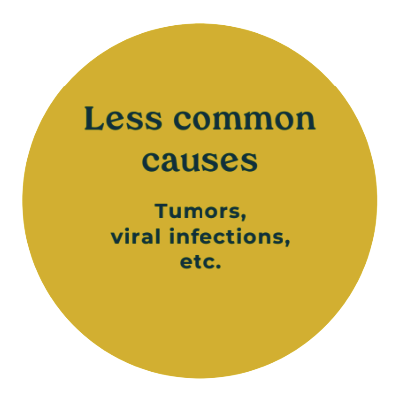Hyprothyroidism
Mary is 38 years old. She’s calling because she hasn’t felt well for quite some time now.
“I think the last time I can say I really felt good was in my early 20s. Then, I got pregnant, had a few kids, and it’s been all downhill from there with my health.”
She explains it started with fatigue, “but I had small kids, so that was normal. Or so I thought.” But it didn’t stop there. The fatigue became more of an issue, even sas the kids got older and she could sleep longer without interruption. Not that the quality of sleep was any good. “I still toss and turn a lot and don’t sleep through the night.”
Then there’s the weight gain, loss of sex drive, thinning hair, aches and pains, and brain fog. “And all that is slowly getting worse. I’m only 38. I shouldn’t feel this old.”
Naturally over the years she shared these concerns with her doctor. After enough complaining, he finally ordered a thyroid test that showed the TSH was high, meaning her thyroid was low function. So, she was put on levothyroxine, or synthetic T4 hormone.
Schedule A Free Discovery Call
Learn more about PEAK and if one of our programs are right for you. Click the button below to schedule a free discovery call.


This helped for a month or two. Energy perked up and she felt better overall, “but pretty I felt like I was before I started the medication.” She told her doctor and he repeated a test. “Nope, your TSH is normal. It’s not that. You probably just need to get better sleep or exercise more.” But she couldn’t do either even after giving it her best effort. Sleep didn’t come easy, and being so tired she could barely do the basics on any given day yet EXERCISE on top of that.
Does this sound familiar? If so, read on.
Hypothyroidism Epidemic?
The single most common health issue people call us for help is for hypothyroidism. This is a condition that has been GROSSLY oversimplified as the body just under producing thyroid hormone. But it’s not quite that simple, and by going (a little bit) into how the thyroid works in the body, we can see where this over simplification goes wrong and what else we can do to help feel better.
Thyroid Explained
When TSH is high, we’re said to be hypothyroid, or have low thyroid function. How does that make sense? Actually, TSH AKA Thyroid Stimulating Hormone is a hormone released by the brain when it senses low thyroid hormone and is a way to tell the thyroid gland to produce more T4. T4 is the less active form of the thyroid hormone. When TSH is high, that means the brain is trying harder to tell the thyroid to release more T4. And when the thyroid can’t produce enough, the brain tries even HARDER, increasing the TSH more and more until it reaches levels that would cause one to be considered hypothyroid.
Once T4 is released, it is then converted to either T3 or reverse T3 (RT3). If it’s converted to T3, or the form of the thyroid hormone that is most active, it binds to cell receptors and activates the cell’s metabolism to do what that cell needs to do.
If T4 is converted to RT3 instead, it fits into the same receptors on the cells but it does not activate the cell. It’s like a key that fits into a lock, but does not turn and unlock it. This will be important and we’ll come back to this down below.
Finally, we have thyroid antibodies. These are immune cells that mistakenly attack our own healthy thyroid cells. This affects their ability to produce enough thyroid hormone.
TSH = Hormone released by the brain, telling the thyroid to make more T4.
T4 = The less active form of the thyroid hormone, produced by the thyroid.
T3 = Active form of thyroid hormone
RT3 or reverse T3 = “anti-T3”, or “T3 blocker”
Thyroid Antibodies – Attacks the thyroid gland
Hypothyroidism
At the simplest level, hypothyroidism occurs when the thyroid doesn’t produce enough T4 leading to the brain increasing its release of TSH high enough to fall into the diagnostic range for hypothyroidism. This then leads to insufficient amounts of T3 in circulation, and this is when we tend to feel all of the symptoms of being hypothyroid.
This begs the question, “why wouldn’t the thyroid be producing enough T4?”
Possible answers:



Autoimmune
Here’s where things get interesting and where the functional medicine approach to thyroid issues starts to differ from conventional medicine.
We can say that someone has Hashimoto’s as the cause of their hypothyroidism, put them on levothyroxine to normalize TSH, and call it a day. This may work for many, even most people in this situation. However, it doesn’t help everyone. And even if it does help, it begs another question…
“What’s causing the autoimmunity?”
Now, we’re starting to dig deep and get closer to the root cause. Why is the immune system attacking healthy tissue?
There are a few possible answers to this question.

Stress
This includes physical and psychological stress, real or perceived.

Hidden Infection
This could be bacterial, fungal, viral, or parasitic and can cause changes in either the immune response (chronic activation) or changes in the microbiome.

Leaky Gut Syndrome
This is when more “stuff” can get into the bloodstream, either from foods or bad “bugs” living in the gut, and this chronically stimulates the immune system.

Molecular Mimicry
Related to hidden infection and leaky gut syndrome above, certain microbial byproducts and food particles like those from gluten and grains can be similar to healthy tissue. By being present in the bloodstream regularly and stimulating an immune response, it can provoke attacks on healthy cells.
So, to effectively treat Hashimoto’s, or at least the underlying reason why the body is attacking itself, all of the above should be addressed.
RT3 – The “wildcard”
We said we would come back to this, and here’s why. There are those that are on medications like levothyroxine that still don’t feel well. They complain to their doctor and TSH and free T4 is checked. It’s within normal range so the doctor doesn’t do anything further. This is where knowing RT3 levels might be helpful.
We covered that the thyroid releases T4. T4 is then converted into T3 and RT3. RT3 blocks T3 from working. But why would the body want to do that?
The thyroid in general is there to set the “thermostat” of our body or our metabolism. More thyroid hormone (or specifically T3), and our metabolism is higher or faster.
But, there are times when our body doesn’t want a high metabolism. In certain circumstances, a higher metabolism could lead to death.
If we look back at the life of humans over 10’s of thousands of years… much spent hunting and foraging and fighting for survival… think about those times when there were droughts, long winters, and otherwise great difficulty finding food. It was an advantage for the body’s metabolism to slow down.
Think about some of what happens with hypothyroidism.
Easily gain weight,
difficulty losing weight.
Fatigue, low energy,
feeling lazy
Low libido, difficult
getting pregnant &
carrying to term
Amazingly, the body is causing us to conserve fat stores and energy and not birth more children into a situation where food and resources are already in short supply. It’s rather amazing!
In modern times, we still have this “protective” system that operates even though it is to our detriment. A variety of factors can cause RT3 to increase.

1. Prolonged infection or illness
2. Calorie restriction
3. Nutrient deficiency
4. Chronic inflammation
5. Stress (from any cause)
6. Chronically poor sleep
*Another cause worth mentioning is that taking too much T4 can cause elevated RT3 since the body will convert a certain amount of it to RT3.
So, we think it is important to test for RT3, especially in those that are hypothyroid and still feel hypothyroid even though their TSH levels are within a normal range. If levels are high, then we know to start digging deeper to find out why the body seemingly wants to turn down thyroid function.
Two Ways To Address Hyperthyroidism
Conventional Medicine
![]() Test TSH and Free T4.
Test TSH and Free T4.
![]() If TSH is high and T4 is low, prescribe levothyroxine (T4).
If TSH is high and T4 is low, prescribe levothyroxine (T4).
![]() Re-test, and if both are within the normal range, then that’s all that is done.
Re-test, and if both are within the normal range, then that’s all that is done.
 PEAK Approach
PEAK Approach
![]() Test ALL thyroid related tests – TSH, Free T4, RT3, free T3, iodine, selenium, B vitamins, antibodies, etc.
Test ALL thyroid related tests – TSH, Free T4, RT3, free T3, iodine, selenium, B vitamins, antibodies, etc.
![]() Also run a comprehensive set of labs to assess all body systems, looking for clues for issues that might be stressing the body (chronic infections, inflammation, nutrient needs, etc.).
Also run a comprehensive set of labs to assess all body systems, looking for clues for issues that might be stressing the body (chronic infections, inflammation, nutrient needs, etc.).
![]() Address diet and lifestyle, recommend modifications. Food allergy elimination diet and/or testing.
Address diet and lifestyle, recommend modifications. Food allergy elimination diet and/or testing.
![]() When needed, do a deeper dive into potential root causes using testing for mycotoxins, viral infections, gut/microbiome, hormones, heavy metal toxins, etc.
When needed, do a deeper dive into potential root causes using testing for mycotoxins, viral infections, gut/microbiome, hormones, heavy metal toxins, etc.
![]() Use supplements to address nutrient needs, repair gut issues, support healing,etc.
Use supplements to address nutrient needs, repair gut issues, support healing,etc.
![]() Use medications when appropriate, sometimes even just short term while correcting other issues. T3+T4 compounded medication may be appropriate for those not converting T4 to T3 efficiently.
Use medications when appropriate, sometimes even just short term while correcting other issues. T3+T4 compounded medication may be appropriate for those not converting T4 to T3 efficiently.
If you would like to take the PEAK approach to thyroid issues, contact us to schedule a free phone consultation.
Initial Phone Consult
- Talk to Dr. Touchinsky about the specifics of the Functional Medicine Program. With a brief review of your personal health status.
Schedule A Call
We believe in 100% transparent pricing, so let’s talk about what is included in our membership plans, how we work with those that have health insurance (98% of our patients do), and any other anticipated costs that may apply to your individual situation and health goals.
Phone and Email
APPOINTMENT HOURS
Monday, Wednesday 9am-7pm
Tuesday, Thursday, Friday 9am-4pm
Outside these hours also available by request
ADDRESS
1120 Centre Turnpike
Orwigsburg, PA 17961
Subscribe For Updates & Health Information
Subscribe to our newsletter to hear about new services and practices at PEAK Integrative Medicine as well as helpful health tips and advice to improve your health.











